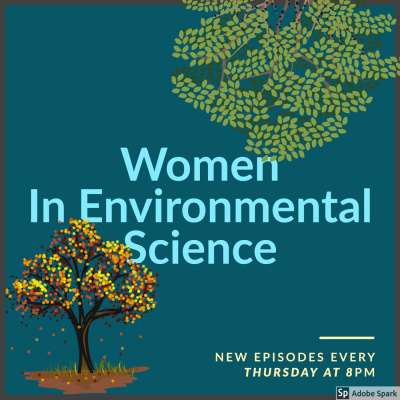
Women In Environmental Science & Engineering
By Saranya Anantapantula
Let's inspire our communities and educate them on the diverse environmental issues leaders in environmental engineering/science are doing! WIESE is a space for Women+ In STEM to share the issues they face in the industry, the solutions they make, the roadblocks they push through, and what they learning to teach society to keep the environment clean! Enjoy!

Women In Environmental Science & Engineering Nov 27, 2023

Episode #41: Dr. Adriana Bankston talks about transitioning to scientific policy, the power of workshops, and success in implementing a law
Adriana Bankston is a Senior Fellow in Civic Science & Public Policy with Sigma Xi, where she leads a project that examines science policy engagement at the state level and determines the skills, knowledge, and resources required by scientists to successfully influence public policy. Prior to this role, Adriana was a Principal Legislative Analyst at the University of California Office of Federal Governmental Relations, where she served as an advocate for the university with Congress, the Administration and federal agencies. Previously, Adriana was a Policy & Advocacy Fellow at the Society for Neuroscience. She is also currently CEO & Managing Publisher of the Journal of Science Policy & Governance, a Fellow with Advancing Research Impact in Society (ARIS), and a Biomedical Workforce & Policy Research Investigator at the STEM Advocacy Institute (SAi). In recognition of her contributions to the field, Adriana was named among the Top 20 in 2022 Advocacy practitioners by the Advocacy Association, and awarded the inaugural 2022 ARIS Emerging Broader Impacts Leader Award. Adriana earned her Ph.D. in Biochemistry, Cell and Developmental Biology from Emory University.

Episode #40: Danielle Becker-Polinski talks about coral reefs, innovative research (epigentics!), and the multifacetedness of marine biology
Danielle Becker-Polinski is currently a Ph.D. student in Dr. Hollie M. Putnam's Eco-Physiology and Environmental Epigenetics of Marine Invertebrates Lab at the University of Rhode Island. Danielle is broadly interested in the ecophysiology within coral reef ecosystems and how global climate change and genomic processes influence coral population dynamics for generations to come.
Her fascination and curiosity with the underwater world, especially coral reef ecosystems, developed into an innate passion for research-based science. To preserve these invaluable ecosystems, She believes we must bridge the gap between education, conservation, and research to convey the significance of coral reef ecosystems to the public.
Danielle's passion for coral reefs is entwined with her interest in conservation and environmental justice initiatives that understand the importance of supporting STEM education and furthering policy agendas for the future of oceanic ecosystems.
Enjoy!

Episode #39: Dr. Lydia Jahl talks about harmful chemicals, public policy, and advocating for sustainable development
Dr. Lydia Jahl is a science and policy associate at the Green Science Policy Institute. There, she collaborates with other scientists, businesses, and policymakers to reduce the use of harmful chemicals in everyday products. Dr. Jahl is a chemist by training, receiving a BS in Chemistry from Harvey Mudd College and a PhD in Chemistry from Carnegie Mellon University. Her research journey began in atmospheric chemistry, studying fog water in the Los Angeles area and the Po Valley in Italy. After a brief stint working as a research chemist at a large winery, Jahl returned to atmospheric chemistry and completed a dissertation on the atmospheric processing of biomass burning emissions. While this fundamental research is important, Dr. Jahl wanted her work to more directly improve environmental health on a shorter timescale. So, she joined the Green Science Policy Institute to work on challenging issues that directly impact both human and environmental health. Her current focus is on phasing out unnecessary uses of flame retardant chemicals and PFAS.

Episode #37: Dr. Virginia Nevárez-Moorillón
Dr. Nevárez-Moorillón has been a full-time professor at the School of Chemical Sciences, Autonomous University of Chihuahua, Mexico, for the last 37 years. She graduated as a bacteriological chemist from the Autonomous University of Chihuahua. She completed her Ph.D. in Biology from the University of North Texas studying the bioremediation of soil contaminated with hydrocarbons, under the supervision of Dr. Gerard Roland Vela. She is a member of the National Outstanding Researchers System of Mexico (Level II) and has been granted the National Award on Food Science and Technology. She is also a regular member of the Mexican Academy of Sciences Her research interests include environmental microbiology, as well as predictive microbiology applied to food systems, the role of lactic acid bacteria in traditional fermented foods, and the antimicrobial properties of spices, such as clove and oregano. Under her supervision, more than 50 undergraduate students, more than 50 master's and 15 doctoral students have completed their degrees. Dr. Nevarez-Moorillón is a member of the Institute of Food Technologists, the Society for Applied Microbiology (UK) and the American Society for Microbiology and has served as Vice-President and President for the Mexican Association of Food Sciences and the Mexican Association for Food Protection. During the last 25 years, Dr. Nevárez-Moorillón has published more than 100 research articles, 25 book chapters and has reviewed manuscripts and research proposals for research publishers and international organizations. She is also part of the Reviewer Board of Polymers, Membranes, and Molecules (MDPI), Associate Editor in Frontiers in Sustainable Food Processing, and Academic Editor in PlosOne.

Episode #36: Sandy Castellano talks about scientific outreach, geochemistry analysis, and the future
Sandy Castellano has a B.S. Earth Sciences with a Concentration in Environmental Science (graduated 2018) and an M.S. Sustainability Science (anticipated graduation Dec 2022). Currently, Castellano is a graduate student at Montclair State University and working as a teaching assistant leading two labs classes for introduction level geology. Castellano is a Latina in STEM and proudly represents Ecuador. Her family immigrated to the United States, and Castellano is proud to have had the opportunity to grow up in this country and be able to seek out and pursue her dreams of being a scientist. She recently completed a summer internship in Cameroon that was funded by the National Science Foundation- IRES focused on geochemistry analysis of an urbanized estuary located in Douala, Cameroon. Castellano is also presenting her research at this year’s GSA conference in Denver.

Episode #35: Dr. Maddie Smith talks about sea ice loss, climate change, and using technology
Dr. Maddie Smith is an Assistant Scientist in the Applied Ocean Physics & Engineering Department at Woods Hole Oceanographic Institution. Motivated by the loss of sea ice in a rapidly changing climate, her research uses observations and modeling approaches to understand how sea ice interacts with the ocean. Her fieldwork has taken her to the oceans at both ends of the earth, including participation in the summer leg of the year-long MOSAiC expedition. Maddie completed her PhD in Civil & Environmental Engineering at the University of Washington, exploring the role of surface waves and turbulence in the autumn Arctic Ocean. She received her B.A. in Earth & Oceanographic Studies and Environmental Science from Bowdoin College in Brunswick, Maine, where she first dreamed of exploring the Arctic while learning about the transpolar drift of Fridtjof Nansen.

Episode #34: Dr. Francesca De Domenico talks about sustainable transportation, hydrogen powered planes, and green infrastructure
Dr. Francesca De Domenico is an Assistant Professor in Novel Aircraft Propulsion at the faculty of Aerospace Engineering at TU Delft. She has a passion for flames and sustainability and her research goal is to disruptively change the way in which we power aircrafts, to make them greener and more sustainable. Specifically, she is interested in developing airplane engines which safely and efficiently use hydrogen as green alternative to kerosene-based jet fuels. She obtained her BSc and MSc in Aerospace Engineering (summa cum laude) from the University of Padova (Italy). Subsequently, she obtained her PhD in Engineering at the University of Cambridge, with her research investigating the sound generated by the flames in combustion chambers (thermo-acoustics). Subsequently, she became a Junior Research Fellow in Engineering at Gonville and Caius College (University of Cambridge), where she worked on developing advanced diagnostic tools for flames (laser-based measurement techniques) and for humans (novel sensors for measuring blood pressure). For her research, Francesca was awarded several prices and fellowships, such as the Amelia Earhart Fellowship (for the 30 best female PhD researchers in Aerospace Engineers worldwide), the APS DFD award, the ASME SACTA award, the Acoustics Society Award, and she was invited to speak at national and international conferences. Francesca is also an active STEM ambassador. She enjoys outreach activities with school pupils and she actively contributes to initiative to promote gender-inclusivity in the education system. In her free time, Francesca enjoys all kinds of outdoor sport and activity, especially running, cycling and hiking. She loves travelling around the world, discovering new places, experiencing new cultures, and admiring the amazing beauty of nature.
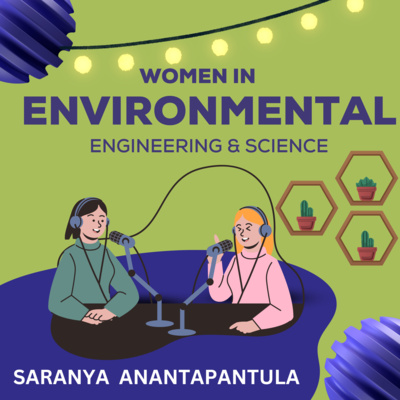
Episode #33: Phebe Bonilla talks about designing water treatment plants, climate change, and capturing carbon dioxide
Phebe Bonilla is a Mexican environmental engineer. She did her undergrad in Puebla, her home city, where she worked for CAISEH, a consultancy company dedicated to doing environmental impact assessments. After finishing her degree, Phebe worked at MAV Integral Engineering and helped design wastewater treatment plants. The following year, she undertook her postgraduate studies at the University of Sheffield, in the UK. After completing her MSc in Environmental and Energy Engineering, she did a PhD in Chemical Engineering, specializing in CO2 capture. She is currently in Denmark, working remotely at Research Retold as a research communicator where she helps researchers to communicate their findings in accessible ways.

Episode #32: Constance Schéré talks about marine protected areas, policy regarding our oceans, and citizen science
Constance Schéré is a PhD candidate at King's College London in the Department of Geography. Her research focusses on the effectiveness of Irish Sea marine protected areas as a sustainable biological conservation tool. Constance has a MSc in Biodiversity, Territory, and Environment (BIOTERRE) from the Sorbonne (Université de Paris 1: Panthéon-Sorbonne, 2017) and a MSc in Environmental Policy from SciencesPo Paris (2013). She completed environmental and research internships at Clean Water Action (2012), Dassault Systèmes (2013-2014), and Harvard University (2014). From 2014 to 2015, she was a sustainability specialist for Sodexo, where she worked in partnership with the Gulf of Maine Research Institute (United States) and the Marine Stewardship Council to promote the sustainable harvest of seafood and marine conservation. She is currently undergoing a doctoral internship with the LPO (French partner of BirdLife International) on the governance, management, and monitoring of the Sept-Îles marine reserve in Brittany, France. In addition to her doctoral research, Constance is part of a number of citizen science projects, including Seasearch and Coastwatch. She is also co-coordinator of Divers Action Group Northern Ireland, which responds to public consultations, proposes new sites for MPA designation, and highlights harmful activities in Northern Irish waters.
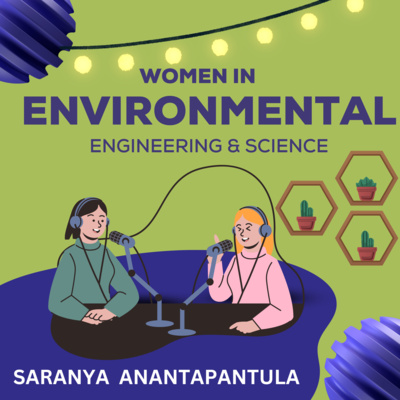
Episode #31: Dr. Kang Lan Tee talks about bioplastics, biochemical engineering, and entrepreneurship
Dr. Kang Lan Tee is recognized for her work in directed evolution, protein engineering, adaptive laboratory evolution and sustainable biomanufacturing. Her contributions to the field include new molecular methods, novel promoters, improved enzymes and enhanced microbial strains for sustainable feedstock utilization. In 2019, she was awarded the Global Challenges Research Fellowship to investigate the use of agricultural waste for bioplastic production in collaboration with The National Center for Genetic Engineering and Biotechnology in Thailand. She has authored 30 publications in high-impact journals such as Nucleic Acid Research, Angewandte Chemie and PNAS and authored the first textbook on protein engineering. As an innovator-entrepreneur, she founded SeSaM-Biotech GmbH (2009, Germany) to deliver enzyme solutions to the biotech industry and Evolutor Ltd (2022, UK) to engineer robust industrial strain for biomanufacturing.

Episode #30: Katrin Steinthorsdottir talks about fixing carbon, geology, and climate change
Katrin Steinthorsdottir (she/her) is a geologist who is doing her Ph.D. at the University of British Columbia (UBC) alongside working for Carbfix. Her work focuses on CO2 storage via mineralization in subsurface ultramafic rocks. She completed her MSc also at UBC on serpentinization and implications for carbon mineralization. Katrin grew up in Iceland, Malta, and the United States, and before moving to Canada, worked on volcano monitoring in Mexico. She acquired her BSc from the University of Iceland, investigating physical volcanology with an exchange year at the University of Bern, Switzerland.
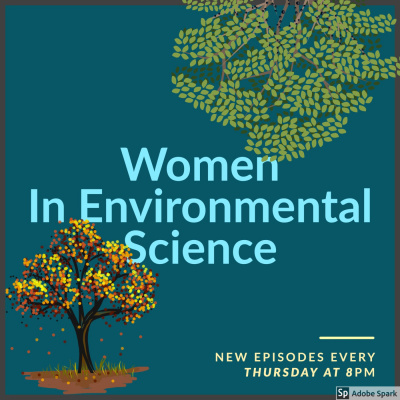
Episode #17: Luisa Diele-Viegas talks about reptiles, their importance in the ecosystem, and human-biodiversity interactions
Luisa Diele-Viegas is currently a visiting professor at the Federal University of Bahia, in Brazil and the vice-president of the Brazilian Association of Ecological Sciences and Conservation. Her research interests involve assessing the impact of human actions on biodiversity, focusing on climate change and reptiles. She also studies the implicit and explicit biases in academia, considering gender, race, ethnicity, class, sexuality, people with disabilities and the intersections between groups. Luisa Diele-Viegas is a climate leader, founder of the science communication project Minha Amiga Cientista, one of the founders of the Fórum Clima Salvador, the Kunhã Asé network of women in science, and the Women in Zoology network. She is a member of UNESCO's Organization for women in science in the developing world and the Diversity and Inclusion Commission of the Brazilian Society of Herpetology!

Episode #29: Dr. Lori Hoepner talks about environmental polluters, health, and socioeconomic factors
Dr. Lori Hoepner received her DrPH in Environmental Health Sciences from the Columbia University Mailman School of Public Health (2015), her MPH in Maternal and Child Health from Tulane University School of Public Health (1995), and her BA in Biology from Barnard College (1994). With over 50 co-authored publications, her research is primarily at the intersection of environmental effects and prenatal/early childhood development. In 2015, Dr. Hoepner received Columbia University’s I. Bernard Weinstein Award for Academic Excellence in Environmental Health Sciences for the DrPH. Her doctoral dissertation focused on the ubiquitous plasticizer bisphenol A (BPA): both its effects on a) adipogenesis in human umbilical cord mesenchymal stem cells in a laboratory setting and b) childhood obesity in an urban minority birth cohort using a molecular epidemiological study design. She has extensive research experience in exposures including BPA, polycyclic aromatic hydrocarbons (PAHs), phthalates, and pesticides, as well as the outcomes of asthma, neurodevelopment, and obesity. Her research efforts have included studies of the World Trade Center tragedy and HIV/AIDS behavioral research. In addition, Dr. Hoepner has over 20 years of organizational and analytical data management expertise involving complex health assessment and public health research datasets. With her background in health disparities research, Dr. Hoepner has the goal of understanding the intricacies of race/ethnicity, sex, and socioeconomics as they pertain to environmental health from a global perspective, as well as from a community-wide perspective.
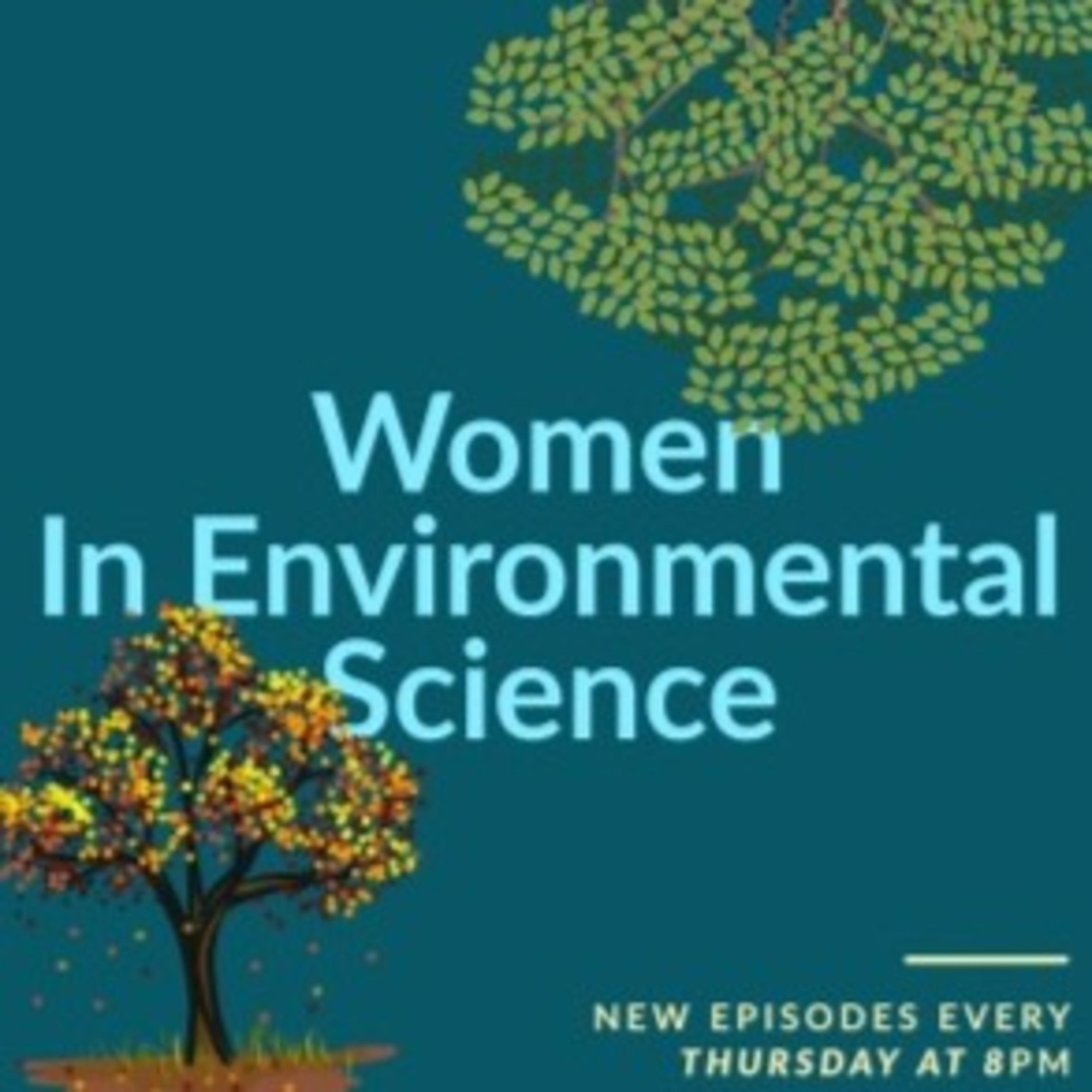
Episode #28: Dr. Maribet Gamboa talks about aquatic organisms, humans, and her typical research process
Dr. Maribet Gamboa is interested in biodiversity assessments by studying the evolution and function of genes of aquatic organisms. Gamboa's main goal is to find clues to adaptation and resilience to climatic change and human disturbance. Gamboa graduated from Universidad Simon Bolivar in Venezuela with a Ph.D. in Biological Sciences and a major in molecular ecology. After that, Gamboa did two postdocs. First, in Berlin, Germany at IGB Leibniz institute for freshwater ecology and inland fisheries and in Matsuyama, Japan at Ehime University. Gamboa became an assistant professor at Ehime University and then at Hiroshima University. Currently, Gamboa is an assistant professor at Universidad Catolica de la Santisma Concepcion in Chile.

Episode #27: Dr. Ashlynn Stillwell talks about energy systems, policy, and the extent of engineering
Dr. Ashlynn S. Stillwell is an Associate Professor and the Elaine F. and William J. Hall Excellence Faculty Scholar in Civil and Environmental Engineering at the University of Illinois Urbana-Champaign. Her research focuses on creating sustainable water and energy systems in a policy-relevant context. She earned a B.S. in Chemical Engineering from the University of Missouri (2006), and an M.S. in Environmental and Water Resources Engineering (2010), M.P.Aff in Public Affairs (2010), and Ph.D. in Civil Engineering (2013) from The University of Texas at Austin. Her previous work experience includes consulting engineering at Burns & McDonnell (2006-2007) and policy research at the Congressional Research Service (2009). Dr. Stillwell received the National Science Foundation CAREER award and the UCOWR Early Career Award for Applied Research for her research work on the energy-water nexus. She was honored with the 2015 Girl Scouts of Central Illinois Woman of Distinction Award in Science, Technology, Engineering, and Mathematics, the 2018 Rose Award for Teaching Excellence, and the 2018 AEESP Award for Outstanding Teaching in Environmental Engineering and Science. Dr. Stillwell has also been among the List of Teachers Ranked as Excellent by their Students at Illinois. She previously served as Chair of the Board of Directors for Girl Scouts of Central Illinois and Faith in Place.

Episode #26: Dr. Natalie Hull talks about clean water, novel methods of water treatment, and microbes
Dr. Natalie Hull studies water microbiology at fundamental and system scales. Her academic background is in civil engineering (University of Kentucky, University of Colorado Boulder) and environmental engineering (University of Colorado Boulder), with post-graduate professional molecular biology and microbiome research (University of Colorado Boulder). Dr. Hull leads the Water TEAM (Treatment Engineering And Microbiome) research group, which investigates sustainable engineering of water microbiology to protect human and environmental health. Her fundamental scale research focuses on optimizing physical ultraviolet light treatment and cellular/enzymatic biological water treatment to combat microbial threats. This includes developing or increasing understanding of methods to detect microorganisms or their biomolecules, determining mechanisms of disinfection or damage to viral and bacterial pathogens or their biomolecules, decreasing antimicrobial resistance, investigating metabolism of natural microbial communities participating in degrading cyanotoxins or in concrete biomineralization, and destroying toxins produced during harmful algal blooms. Her system scale research investigates links between water microbiomes and human health, and between engineering and human factors on Appalachian water systems. Her continued research will integrate understanding of fundamental impacts of engineered treatments on water microbiology and their translation to sustainable, healthy water systems.

Episode #25: Kaitlin Urso talks about working with small businesses, environmental policy, and being a leader
Kaitlin Urso is an environmental consultant with the Colorado Department of Public Health and Environment that specializes in helping small businesses, specifically breweries and cannabis businesses, reduce their environmental impacts. Kaitlin's work to advance environmental sustainability in cannabis and craft brewing has been featured in Wall Street Journal, Forbes, CNN, NPR, Science Magazine, and countless industry publications. She has 10 years of technical environmental experience at CDPHE and a mechanical engineering degree.

Episode #24: Dr. Onita Basu talks about water treatment, clean water, and the research process
Onita D. Basu, PhD., P.Eng. is a Professor (Civil/Environmental Eng) and Associate Dean (Faculty of Graduate Studies) at Carleton University. Dr. Basu obtained her bachelors’ (Chemical Engineering (honours)) and masters’ degree (Civil/Environmental Engineering) at the University of British Columbia, subsequently hopping over to the University of Waterloo to obtain her Ph.D (Civil/Environmental Engineering). Dr. Basu is a process specialist with a particular focus in water, and wastewater process design. She has advanced knowledge, experience and practical skills with analytical methods, as well as experimental design, set-up and design of both pilot scale and full scale experiments. Dr. Basu, also has been working within a remote community in Tanzania to improve access to clean water. This partnership has enhanced her personal awareness that technology alone is not the sole solution in many communities and the need for interdisciplinarity in projects. Dr. Basu has also been working in the field of upcycling waste organics in the circular economy through novel hydrothermal polymerization methods. Upcycling of waste organics holds great potential for co-creation of advanced water treatment products. Dr. Basu strongly promotes the learning and advancement of HQPs through a team environment as well as active assistance in presentation preparation, data analysis, and manuscript writing. Dr Basu received a Carleton Faculty Graduate Mentorship award in 2021, a Carleton Teaching Award in 2021, a 2020 Ottawa Chapter Professional Engineers Civics Award and a Carleton Research Award in 2019. Overall, she considers herself to be an “Average Jane” professor who believes the term work-life balance is hilarious and silly, she concedes she can “work well” or “do life well” but never both at the same time not is she too worried about it.

Episode #23: Dr. Laura Guertin talks about education, earth science, and quilting
Laura Guertin holds a Ph.D. in Marine Geology & Geophysics from the University of Miami's Rosenstiel School of Marine & Atmospheric Science and has served as an Earth Science faculty member at Penn State Brandywine since 2001. She has received funding from the EPA and has been a PI/co-PI on several NSF projects relating to geoscience education and outreach. She teaches introductory-level general education Earth science, geoscience, and geography courses for non-science majors. She is a Fellow of the Geological Society of America, a blogger on geoscience education and educational technology with the American Geophysical Union (GeoEd Trek). She has published on innovative and effective uses of new and emerging technologies to enhance teaching and student learning in the introductory-level college classroom.

Episode #22: Dr. Eleftheria Kontou talks about transportation, electric vehicles, and improving infrastructure
Dr. Kontou is an assistant professor at the Department of Civil and Environmental Engineering of the University of Illinois at Urbana-Champaign. Her research focuses on sustainable and electrified transportation systems planning and management. Dr. Kontou’s research group develops quantitative models and data-driven solutions to emerging mobility challenges. She received her PhD in Civil Engineering, focusing on transportation systems, from the University of Florida. She holds a MSc from Virginia Tech in the same field. She graduated with a Diploma in Civil Engineering from the National Technical University of Athens. She was a postdoctoral research associate at the Transportation and Hydrogen Systems Center of the National Renewable Energy Laboratory and the Department of City and Regional Planning at the University of North Carolina at Chapel Hill. She is a member of the Transportation Research Board (TRB) Committee on Alternative Fuels and Technologies and the Chair of the NAE’s TRB Young Members Coordinating Council. She is 2022 Illinois-Indiana Sea Grant Faculty Scholar, was a 2021 US Frontiers of Engineering Invited Participant, and was recognized as a 2020 iSEE Levenick Sustainability Teaching Fellow at the University of Illinois. She is a member of the Editorial Advisory Board of the Transportation Research Part D: Transport and Environment journal and an Early Career Advisory Board member of the Transportation Research Part C: Emerging Technologies journal, as well as serves as a member of the Steering Committee of the Chicago Area Clean Cities Coalition.

Episode #21: Dr. Cynthia Gerlein-Safdi talks about ecohydrology, wetlands, and climate change
Dr. Cynthia Gerlein-Safdi is an ecohydrologist interested in understanding water-carbon relations within the soil-plant-atmosphere continuum. She uses an array of methods, from satellite data to process-based modeling, from stable isotopes lab experiments to field measurements. Dr. Gerlein-Safdi graduated with her PhD from the department of Civil and Environmental Engineering at Princeton University in 2017 and was a junior fellow from the Michigan Society of Fellows from 2017 to 2020, working in the department of Climate and Space Sciences and Engineering. She started as a Project Scientist at Lawrence Berkeley National Laboratory in October 2020 and is part of the Climate & Ecosystem Sciences Division, splitting her time between the Watershed Function SFA and the Terrestrial Ecosystem Science SFA team. In this new setting, she is continuing her work linking the water and carbon cycles in vegetation, understanding the effects of dew, fog, and rain interception on plant function and water resources, and combining stable isotopes, remote sensing, and process-based modeling to get an understanding of how these processes hold across spatial and temporal scales.

Episode #20: Dr. Bethany Laursen talks about environmental philosophy, being interdisciplinary, and her research
Bethany Laursen, Ph.D., M.A., M.S., is an integration and implementation studies (I2S) specialist with Laursen Evaluation & Design, LLC, where she empowers knowledge professionals to make sense of sustainability issues by using the right tool at the right time. Her research reveals how these tools work as aids to cross-disciplinary communication, cognition, and collaboration. Bethany’s strong understanding of cross-disciplinary process is rooted in her own formal training in seven disciplines, two inter-disciplines, and one trans-discipline; five years as a K12 educator; and seven years as an environmental evaluator. Bethany is a member of the award-winning Toolbox Dialogue Initiative. She is also a research and evaluation partner with the National Socio-Environmental Synthesis Center (SESYNC) and a founding member of the Global Alliance for Inter- and Transdisciplinary Research and Education (ITD Alliance) Working Group on Toolkits and Methods. Bethany is currently the Assistant Dean at Michigan State University's Graduate School, and she loves cats and canoes.

Episode #19: Maitreyi Koduganti Venkata talks about community involvement, action-oriented research, and art
Maitreyi Koduganti works as a researcher at the Indian Institute for Human Settlements, India. Koduganti is also a part of the Advisory Board of the Water Youth Network. Koduganti has earned a second Master’s degree in Water Management and Governance from UNESCO-IHE Institute for Water Education, the Netherlands. Much of her work in the last four years focused on climate sciences, vulnerability studies, resource management, gender studies, sustainability and Research-into-Use. Koduganti's inclination towards action-oriented research have resulted in developing documentaries and participatory games. Hailing from India that faces climatic risks at multiple scales, she believes and engage in working at the ground level along with local communities to bring about small, yet meaningful changes.

Episode #18: Dr. Gabrielle Boisrame talks wildfires, mountain watersheds, and modeling
The majority of Dr. Gabrielle Boisrame’s research focuses on the interactions between wildfire, land cover, and water in mountain regions of the Western USA. Since 2013 she has been using a combination of fieldwork, remote sensing, and hydrological modeling to explore how managing natural wildfires in landscapes can improve water resources and forest health.

Episode #16: Dr. Clarice Demarchi Aiello talks about quantum engineering, biology, and uses of quantum science for the environment
Clarice D. Aiello is a Brazilian quantum engineer, leader of UCLA’s Quantum Biology Tech Lab (QuBiT) and interested in how quantum physics informs biology at the nanoscale. She holds a Diplôme d'Ingénieur from the École Polytechnique (France), a Physics MPhil from the University of Cambridge (UK) and a PhD from MIT in Electrical Engineering. Prior to joining UCLA, Clarice held postdoctoral appointments in Bioengineering at Stanford and in Chemistry at Berkeley. Throughout her career, she received fellowships and/or awards from institutions such as the Moore Foundation, the Schlumberger Foundation, Fullbright, UNESCO and the French Ministry of Foreign Affairs. She was also recognized by MIT’s School of Engineering’s Award for Extraordinary Teaching and Mentoring. Clarice is actively engaged in fostering the quantum biology field as organizer of an international series of trainee-focused weekly talks about Quantum Biology and also as chair/keynote speaker in venues such as the NSF Nanoscale Science and Engineering Grantees Conference (2019); The Australian and New Zealand Conferences on Optics and Photonics (ANZCOP/SPIE) (2019); The IEEE MIT Undergraduate Research Technology Conference (2019); MindshareLA (2020); HRL Laboratories (2020) and the 2020 APS March Meeting.

Episode #15: Dr. Kathy Licht talks about ice, working in polar regions, and climate change
Dr. Kathy Licht's research focuses on understanding the history of the Antarctic ice sheet so her research group can better determine what causes it to advance and retreat and how that fits in with the global climate system. Licht holds several active grants through the National Science Foundation that have provided opportunities for their research group to collect field data, which provides important new data to help determine Antarctica's history. One project builds on previous work in the Ross Sea (Licht et al., 2014) and includes a provenance analysis of glacial sediments in the Weddell Sea region of Antarctica. A second grant provided funding to collect radar data that lets us see beneath the ice surface and characterize the internal structure of the ice. The glacial deposits at this research site are unusual because they contain a relatively continuous sequence of glacial deposits spanning more than one glacial-interglacial cycle, helping to document ice sheet changes on these long-time scales.

Episode #14: Dr. Antonella Panebianco talks about guanacos, drones, and conservation
Dr. Antonella Panebianco is a Postdoctoral Fellow of the National Council of Scientific and Technological Research of Argentina. Panebianco completed her Ph.D. at the University of Buenos Aires (Argentina) in 2019. Panebianco is interested in studying the modulation of physiological and behavioral aspects in wildlife in the context of environmental change. For her Ph.D., Panebianco worked with guanacos, the largest South-American camelid, studying the factors influencing aggression during the reproductive season and its relationship with reproduction. Currently, Panebianco's post-doctoral research is oriented toward assessing the potential impact of using drones as novel tools for monitoring wildlife for ecological, recreational, or productive interest. The results of these projects have been published in scientific journals and conferences and include topics of physiology, behavior, ecology, conservation, and sustainable use. Besides her academic interests, Panebianco works in an NGO called "Conservación Patagónica" which manages a Natural Urban Reserve in Argentinean Patagonia. Reserva Natural Urbana Cotesma aims to bring nature closer to the community through recreational activities such as bird watching and photography, among others. In addition, they coordinate an environmental education program for students of all levels, in which children are encouraged to discover what it is that connects them with nature and, based on this positive link, to understand the importance of natural environments and their conservation.

Episode #13: Dr. Rachel Shaffer talks about toxicology, environmental health, and potential solutions
Dr. Rachel Shaffer graduated from Yale University with a BA in Environmental Studies (with a concentration in Environmental Health). After college, Shaffer worked in the Health Program at the Environmental Defense Fund (EDF) in Washington, DC. Shaffer contributed to projects related to the reform of the Toxic Substances Control Act (TSCA), risk assessment, systemic review, conflict of interest in chemical review panels, emerging methods in toxicity testing, and Latino health community engagement.
Shaffer has an MPH in Environmental and Occupational Health and a PhD in Environmental Toxicology from the UW Seattle School of Public Health. Shaffer's MPH thesis evaluated the association between phthalates and gestational diabetes. Shaffer's Ph.D. dissertation research focused on fine particulate matter (PM2.5) and dementia.

Episode #12: Dr. Diana Vieira talks about wildfire, soil erosion, and the importance of technology in environmental engineering
Diana Vieira is an Environmental Engineer with a special focus on soil erosion risk. She dedicated most of her time to monitoring burned areas and understanding the underlying key processes in fire-affected soils and landscapes to better adapt models to burned conditions. During her research path, she was the Principal investigator of the FEMME project and supervised Ph.D. theses, postdoctoral and MSc fellowships, participated in national and EU projects, and organized international scientific events. Currently, in the European Soil Observatory, she is dedicated to large-scale post-fire soil erosion modeling, land degradation, healthy soils, and the assessment, fate, and remediation of soil pollution in EU soils. Diana Vieira is also dedicated to knowledge transference and strongly believes that art and technology should go hand in hand, and is a fervent advocate for equity and diversity.

Episode #11: Dr. Eri Saikawa talks about Atmospheric Chemistry, Air Pollution, and Education to Everyone
Dr. Eri Saikawa is an Associate Professor in the Department of Environmental Sciences at Emory University. She is the Director of both Graduate Studies and the Emory Climate Talks Program in the department. She is jointly appointed in the Gangarosa Department of Environmental Health and is also an affiliated faculty in the Institute for Quantitative Theory and Methods, the East Asian Studies Program, as well as in the Center for Study of Law, Politics and Economics. She received a Bachelor of Engineering and studied chemistry and biotechnology at the University of Tokyo. She then received Master of Public Affairs at Indiana University, Bloomington, studying environmental policy and natural resource management. She pursued her Ph.D. in the Science, Technology and Environmental Policy program at Princeton University. She was a Postdoctoral Associate and a Research Scientist at Massachusetts Institute of Technology before she joined Emory University in 2013. She is curious about anything related to air pollution and climate change. Her work includes assessing emissions from understudied sources, such as brick kilns and garbage burning. She is also working on climate-smart agriculture. Her team recently found heavy metal soil contamination in the Westside of Atlanta and it has led to a Superfund Site investigation by the EPA.

Episode #10: Dr. Heidi Steltzer talks about Mountain Science, Exploring, and being a Listener
The chat I had with Dr. Heidi Stelzer was very fascinating as she took me into her hilarious personal experiences and deep into the field of mountain sciences.
Dr. Heidi Steltzer is a mountain scientist, explorer, and science storyteller. She has spent 25 years conducting field studies in remote regions of Colorado, Alaska, Greenland and recently China to understand how mountain ecosystems are unique and valued regions of our world. Dr. Heidi Steltzer is a lead author on High Mountain Areas in a recent Intergovernmental Panel on Climate Change report and has testified before US Congress on climate change. In January 2020, she testified before the US House Committee on Science, Space and Technology about the Climate Crisis. Find her on social media @heidimountains. National Geographic, 2019, https://www.nationalgeographic.com/environment/2019/09/ipcc-report-climate-change-affecting-ocean-ice/ The Colorado Sun, 2019: https://coloradosun.com/2020/01/21/climate-change-water-snow-modeling-crested-butte/

Interview with Dr. Devyani Singh #9
Dr. Devyani Singh is a Post-Doctoral Fellow working on various projects under the umbrella of the Energy and Climate policy. Her research has included energy access & transitions in the Global South, air-quality modeling, evaluating climate impacts of national policies, natural resource economics, environmental [carbon] finance, forest sustainability, and most recently, methane emissions from oil and gas production. Devyani is BC Greens candidate for Vancouver-Point Grey and will bring more honesty, science, justice, and transparency to the government! Listen
In this episode of Women In Environmental Science, we look into how different parts of the world need to address climate change differently and not compare each other constantly! Listen more to dive into an adventure of how humans are impacting the Earth.

Interview with Ms. Christine Shields #8
Christine Shields is an Associate Scientist in the Climate Change Research Section at NCAR with expertise in simulating Earth’s past, present, and future climate with the Community Earth System Model. Christine’s focus is toward understanding Earth’s hydrological cycle in the context of climate change, with particular emphasis on atmospheric rivers (ARs), monsoons, moisture transport, cyclones, and weather extremes. Christine’s research spans much of Earth history, including simulations of Deep Time (millions of years ago), lead by Dr. Jeffrey Kiehl.
In this episode of Women In Environmental Science, we learn about climate change exacerbating multiple factors that influence natural disasters. We also learn about how climate models work and how we can look at the past to understand the future. Listen more to dive into an adventure of the present, past, and future and how humans can influence the Earth in ways we CAN imagine.

Interview with Dr. Edith Newton Wilson #7
Edith Newton Wilson, Ph.D., works to engage emerging professionals in energy solutions for a changing world. With degrees from Dartmouth and Johns Hopkins, Edith is a Fellow of the Society of Economic Geologists and the Geological Society. Her global career began with Amoco, BP, and Phillips, and culminated in founding Rock Whisperer, a renewable energy and climate mitigation consultancy.
Our conversation about energy had really made me understand why energy is so useful: it gets throughout the day by keeping us alive, going to work, eating food, and beyond. Listen to this episode to learn about energy, why it's so important, and how and why we will change to a cleaner source of energy!

Interview with Jessica Roberts #6
Jessica Roberts does work on reintroduction science. She is a graduate student from George Mason University in Virginia. Her research is focused on whether behavioral training in captivity can prepare parrots for survival in the wild. She researched studying the anti-predator behavior of vinaceous amazons in captivity. Since talking about parrots isn't a 'birden' to any of us, join me as I speak with Ms. Roberts on her amazing experiences with animals. To hear more, listen to this enthralling chat with Jessica Roberts!
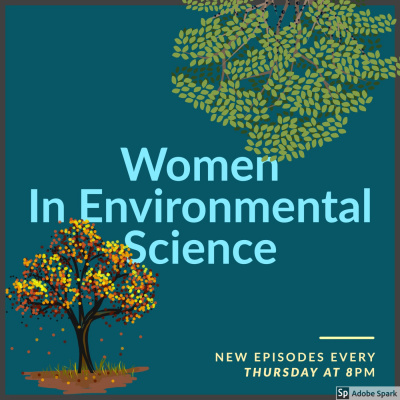
Interview with Dr. Emily Lescak #5

Interview with Dr. Rachel Kirpes #4
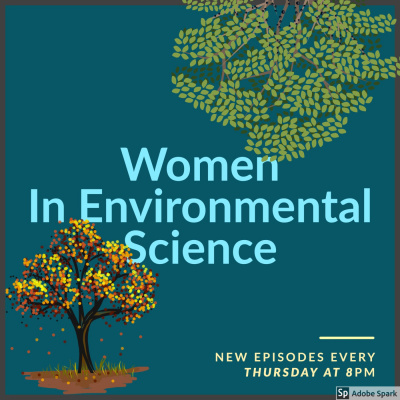
Interview with Ms. Allison Crimmins #3

Interview with Dr. Casey Bartrem #1
Dr. Casey Bartrem is Executive Director and Senior Environmental Scientist at TerraGraphics International Foundation (TIFO), an international organization that assists mining and recycling communities to address environmental pollution. Her work and research focus on environmental health, environmental security, and environmental justice. Dr. Bartrem has led projects in Kyrgyzstan, Bangladesh, Nigeria, and the United States in close collaboration with local stakeholders, government representatives, humanitarian organizations such as Doctors Without Borders, and other NGOs. She is a Fellow of the Collegium Ramazzini, an independent, international academy of 180 renowned scientists in the fields of occupational and environmental health. She has presented at conferences in North America, Europe, Africa, and Asia, and has served on numerous graduate research committees for students in the US and Armenia. From 2007-2009, Dr. Bartrem was a United States Peace Corps Volunteer in the Kingdom of Lesotho, working with communities on grassroots health and development projects. In her work, Dr. Bartrem has analyzed how the increase in "green" energy is creating massive demand for minerals needed to power batteries, solar panels, and wind turbines. Her research also focuses on how climate-related conflicts interact with environmental degradation, human dimensions, and extractive industries to shape humanitarian response and project sustainability. From 2010-2022, Dr. Bartrem occupied a key leadership role in the Zamfara, Nigeria Emergency Environmental Response, which was awarded the 2011 Green Star by the United Nations Environment Program.
